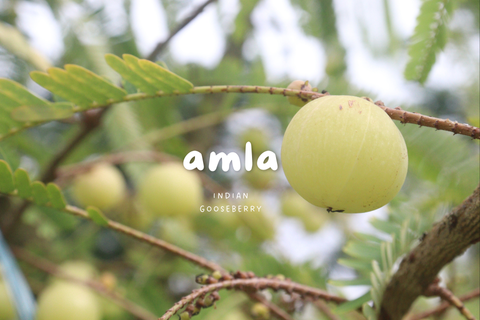The History of Amla
Amla, scientifically known as phyllanthus emblica, is a powerful herbal adaptogen celebrated for its remarkable health benefits. Amla holds cultural significance in various traditions, especially in Southeast Asia.
Also known as the "indian gooseberry," it is prized for its incredible nutritional content and ability to promote health and vitality.
In Sanskrit, it is known as आमलकी Amalaki, symbolizing its ability to restore health and vitality. Amla is revered in Indian culture for its ability to promote longevity and rejuvenation.
In Chinese, it is referred to as 余甘子 (Yú gānzǐ), which translates to emblica, a fruit revered for its medicinal properties and antioxidant-rich benefits.
Buddhist Significance

The Melaka tree phyllanthus emblica, is the same specie as Amla under different botanical names. Where in Theravada Buddhism, the Melaka tree is revered as the site where the twenty-first Buddha, known as Pussa, attained enlightenment.
Meditating near the Melaka tree fosters mindfulness and serenity, allowing practitioners to cultivate inner peace, honoring its spiritual legacy and strive to emulate the qualities that led the Buddha to his awakening.
This connection underscores the tree's spiritual importance, making it a focal point for meditation and reflection.
Hindu Significance

In Hindu culture, Amla is believed to possess divine origins, emerging from the tears of Lord Vishnu.
This sacred narrative imbues Amla with attributes of purity, life force (prana), and spiritual vitality. The tree symbolizes renewal and healing, and its fruit is viewed as a divine gift, carrying the essence of amrita, the nectar of immortality.
Historically, Amla has been incorporated into rituals, and its presence is thought to bring good fortune and safeguard against negative energies.
In Ayurvedic medicine, Amla's application is seen as an extension of its sacred status, promoting a balance of mind, body, and spirit.
The Characteristics of Amla
Although Amla is often referred to as a citrus fruit due to its flavor and high vitamin C content, it actually belongs to a different plant family. Citrus fruits are part of the rue family (Rutaceae), whereas Amla, belongs to the Phyllanthaceae family.
Known for its high vitamin C content, Amla is a potent antioxidant that supports immune health and overall well-being.
In Ayurveda, Amla is classified as a Rasayana, a category of herbs known for their rejuvenating qualities. It is revered for its ability to nourish the body, improve vitality, and promote longevity.

What Benefits does Amla provide?
Amla possesses a remarkable range of medicinal properties that have been celebrated in Ayurvedic medicine for centuries.
It is rich in vitamin C, antioxidants, and phytochemicals, which help to strengthen the immune system, enhance digestion, and promote healthy skin and hair.
Benefits
- Fosters a healthy immune system: One of Amla's most significant benefits is its ability to strengthen the immune system. Its high vitamin C content enhances the body's defenses, promoting resilience against common colds and infections.
- Skin and Hair Health: Amla is renowned for its benefits to skin and hair. Its antioxidant properties help maintain youthful skin and may reduce the appearance of wrinkles. Additionally, Amla can promote healthy hair growth, strengthen hair follicles, and reduce dandruff.
- Enhances Digestive Health: Amla aids digestion by stimulating the digestive system and promoting regular bowel movements. It helps alleviate issues such as bloating, gas, and indigestion, making it an excellent choice for those seeking digestive support.
- Promotes Healthy Blood Sugar Levels: Amla aids in stimulating microcirculation and purifying the blood, contributing to the maintenance of healthy blood sugar levels within the normal range. Additionally, it supports the urinary tract's health and promotes healthy urine excretion, both of which are essential for balanced blood sugar levels.

Amalaki and Ayurveda
In Ayurveda, Amla is characterized by a predominantly sour rasa (taste), complemented by hints of sweetness, pungency, bitterness, and astringency. Its virya (action) is considered cooling, while the vipaka (post-digestive effect) leaves a sweet impression.
Amla holds five of the six tastes—sour, sweet, pungent, bitter, and astringent—while notably lacking the salty taste. This diverse flavor profile stimulates digestion, enhances appetite, and ignites agni (the digestive fire).
Although the primary taste is sour, which can potentially aggravate pitta-type digestion, it effectively fuels the digestive fire without causing harm or imbalance. In fact, its bitter notes and cooling properties make it especially effective at alleviating excess pitta in the digestive tract.
Amla is rich in sattva, the quality associated with purity, clarity, and higher consciousness. Ayurveda encourages the cultivation of sattvic energy to foster these positive attributes within ourselves.

What is Amla Good For?

- Seeking Immune Support: Amla is ideal for those looking to strengthen their immune system and enhance their body’s defenses against infections.
- Enhance Skin and Hair Health: Beneficial if you are interested in maintaining youthful skin and promoting healthy hair growth. It’s great for individuals dealing with skin aging, hair thinning, or dandruff.
- Digestive Issues: Amla is an excellent choice for individuals experiencing bloating, gas, or other digestive discomforts. It supports regular bowel movements and overall digestive health.
- Maintains blood sugar levels: Suitable for those looking to maintain healthy blood sugar levels, especially for individuals concerned about diabetes or those seeking to manage their weight effectively.
By integrating Amla into your daily routine, you can unlock its potential to boost your immune system, support digestive health, and promote radiant skin and hair, making it an essential addition to your wellness journey.
How to take Amla
Thanks to its refreshing taste and nourishing properties, Amla can be consumed on its own or blended with other ingredients for added benefits.

- Supplements: Incorporating Amla into your routine can be as easy as taking daily capsules. This allows you to benefit from its immune-boosting and antioxidant properties, helping to strengthen your body’s defenses.
- Amla Powder: To enjoy Amla powder, mix it into warm water, smoothies, or yogurt for a delicious and nutritious boost that supports digestion and overall health.
- Fresh Amla: Fresh Amla can be added to salads, chutneys, or smoothies, providing a tangy flavor along with its numerous health benefits.
- Juice: Amla juice is another popular option. Dilute it with water or mix it with other fruit juices for a refreshing drink rich in vitamins.
- Amla Hair Oil: Use Amla-infused hair oil to nourish your hair and scalp, promoting healthy hair growth and reducing dandruff.
Contraindications
If you have had recent surgery, it's best to avoid Amla until fully recovered, as its blood-thinning properties may interfere with healing. Amla can interact with certain medications, particularly blood thinners and diabetes medications, so consulting with a healthcare provider before combining Amla with any prescription drugs is essential.







